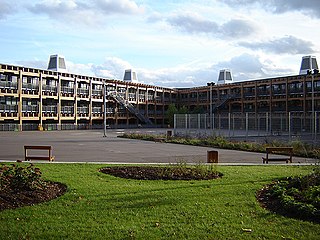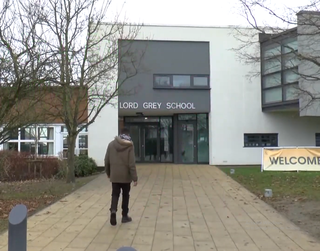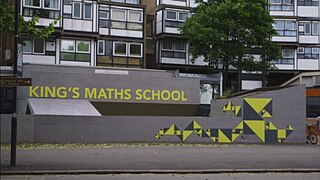Related Research Articles

The Department for Environment, Food and Rural Affairs (Defra) is the government department responsible for environmental protection, food production and standards, agriculture, fisheries and rural communities in the United Kingdom of Great Britain and Northern Ireland. Concordats set out agreed frameworks for co operation, between it and the Scottish Government, Welsh Government and Northern Ireland Executive, which have devolved responsibilities for these matters in their respective nations.
A General National Vocational Qualification, or GNVQ, was a certificate of vocational education in the United Kingdom. The last GNVQs were awarded in 2007.

The specialist schools programme (SSP) was a government programme in the United Kingdom which encouraged primary and secondary schools in England, Scotland and Northern Ireland to designate as specialist schools – schools that specialise in certain areas of the curriculum – to boost achievement and diversity. The programme was introduced under Prime Minister John Major's Conservative government through the Education Act 1993 and was further expanded upon by Tony Blair and Gordon Brown's New Labour governments. The Specialist Schools and Academies Trust (SSAT) was responsible for the delivery of the programme, directing its development through the influence of Chairman Cyril Taylor. The scheme ended in 2011 in favour of mainstreamed specialist school funding, by which time 96.6% of state secondary schools in England were specialist, with only 80 remaining unspecialised.

An academy school in England is a state-funded school which is directly funded by the Department for Education and independent of local authority control. The terms of the arrangements are set out in individual Academy Funding Agreements. Most academies are secondary schools. However, slightly more than 25% of primary schools, as well, as some of the remaining first and middle schools, are also academies.

Lord Grey Academy is a comprehensive 11-19 coeducational secondary academy and sixth form in West Bletchley, Milton Keynes, England. Previously a grant-maintained foundation school and specialist language and humanities college, the school academized on 1 April 2018 under the sponsorship of the Tove Learning Trust. It was created from the amalgamation of the Bletchley Grammar School and Wilton County Secondary School in 1973, opening on the site of the latter. From 2011 to 2014 the school operated, in partnership with Sir Herbert Leon Academy, the Milton Keynes South Sixth Form. Although this sixth form was discontinued the school still provides sixth form education independently.

The Buckingham School is a co-educational secondary school in Buckingham, Buckinghamshire, United Kingdom.
Codsall Community High School is a coeducational upper school and sixth form located in Codsall, Staffordshire, England. In September 2004 it became the first to achieve specialist school status in Maths and Computing and in 2013 was rated good by Ofsted. It is a comprehensive school in a large village in South Staffordshire, near Wolverhampton. A total of 1017 pupils attend the school.
SSAT Limited is a UK-based, independent educational membership organisation working with primary, secondary, special and free schools, academies and UTCs. It provides support and training in four main areas: teaching and learning, curriculum, networking, and leadership development.

A Secondary School Based In England

Wilmington Academy is a mixed secondary school located in Wilmington, Kent in the United Kingdom. It stands next to the site of Wilmington Hall.

St Wilfrid's Catholic High School is a mixed secondary school and sixth form with academy status located in Featherstone, West Yorkshire, England. It also has dual Language and Vocational specialisms.

In the United Kingdom, a Technology College is a specialist school that specialises in design and technology, mathematics and science. Beginning in 1994, they were the first specialist schools that were not CTC colleges. In 2008, there were 598 Technology Colleges in England, of which 12 also specialised in another subject.

Montgomery Academy is a co-educational secondary school located in Bispham in the English county of Lancashire.
Harlington Upper School (HUS) is a rural, coeducational upper school and sixth form with academy status in Harlington, Bedfordshire, England.

Thornhill Community Academy is a coeducational secondary school with academy status situated just outside Dewsbury, West Yorkshire, England.

The Baverstock Academy was a mixed secondary school and sixth form college, located on the southern edge of the Birmingham suburb of Kings Heath.

A specialist school, also called a specialist college, is a type of school or sixth form in the United Kingdom, usually a secondary school, that specialises in a certain field of curriculum. Specialist schools may receive additional funding from sponsors and/or the government to a varying degree. These funds are then used to expand the provision and facilities of selected specialist subject areas, known as "specialisms". Three of the four constituent countries of the United Kingdom have – or have had – specialist schools, with the one exception being Wales.

North Walsham High School is a co-educational secondary school located in North Walsham in the English county of Norfolk. On the same site there is the shared-use Atrium Arts Centre.
Walker Riverside Academy is a co-educational secondary school and sixth form located in the Walker area of Newcastle upon Tyne, Tyne and Wear, England.

A maths school is a type of specialist free school sixth form college in England which specialises in the study of mathematics. Each maths school is sponsored by a university and, frequently, also a nearby established sixth form college or multi-academy trust. All students in a maths school must follow a course of study that includes A-levels in mathematics and further mathematics. Maths schools receive additional funding from central government, above what a standard sixth form college would receive, with the aim of providing an enriched curriculum and student experience, so that students are better prepared for studies in mathematics or related subjects at competitive universities, or for careers requiring high levels of mathematical skill. Maths schools are selective and all students seeking to apply must have, at minimum, a grade 8 in GCSE mathematics. Students must also sit an entry exam before being admitted.
References
- ↑ "The Rural Dimension". slideplayer.com. Retrieved 2022-01-07.
{{cite web}}: CS1 maint: url-status (link) - 1 2 3 4 "Rural Dimension update summer 2004" (PDF). Archived (PDF) from the original on 2006-11-03.
- ↑ "Evaluating the impact of the rural dimension" (PDF). Retrieved 2022-01-07.
{{cite web}}: CS1 maint: url-status (link) - 1 2 "Specialist Schools". Politics.co.uk. Retrieved 2021-12-24.
- 1 2 "Specialist schools programme: Michael Gove announces changes". GOV.UK. Retrieved 2021-12-25.
- ↑ "Examination of Witnesses (Questions 220-239) Tuesday 8 April 2003". www.parliament.uk.
{{cite web}}: CS1 maint: url-status (link) - ↑ "Written Answers to Questions Friday 20 June 2003". www.parliament.uk.
{{cite web}}: CS1 maint: url-status (link) - ↑ "Rural Dimension update spring 2005" (PDF). Archived (PDF) from the original on 2006-09-26.
- ↑ "Rural Dimension update summer 2005" (PDF). Archived (PDF) from the original on 2006-11-03.
- ↑ "Rural Dimension update autumn 2005" (PDF). Archived (PDF) from the original on 2006-11-03.
- ↑ "Rural Dimensions update summer 2006" (PDF). Archived (PDF) from the original on 2006-11-03.
- ↑ "Rural Dimension update autumn 2006" (PDF). Archived (PDF) from the original on 2006-09-26.
- ↑ "SSAT Annual report 2009/2010" (PDF). Retrieved 2022-01-07.
{{cite web}}: CS1 maint: url-status (link) - 1 2 Rural dimension new perspectives , retrieved 2022-01-07